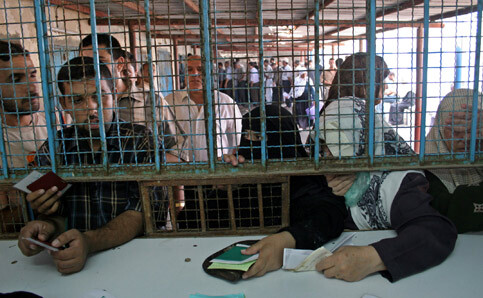IRIN 11 September 2006

Palestinians receive their monthly aid from UNRWA in Al-Shate’ refugee camp in Gaza City, 10 Sep 2006. (MaanImages/Thaeer Al-Hassany)
GAZA CITY - Gaza City’s shopping markets used to be the richest in the Palestinian territories, but six months into a crippling trade embargo, stocks are running low.
“This is the tenth store I approach to buy a single box of powdered milk for my little baby. I do not know what to do. I am ready to pay double price for having only one package, but there is none”, said 32-year-old Tareq Omar after he failed to find any powdered milk for his one-year-old baby in Gaza’s Al-Zawiya market.
Gaza is a Palestinian-administered strip of land bordering Israel and Egypt. It was fully occupied by Israel from 1967 until mid-2005, when it was handed over to the Palestinian National Authority (PNA).
An economic embargo by the United States, the European Union (EU) and Israel was imposed on the occupied Palestinian territories (oPt) following the democratic election of a Hamas-led Palestinian government in February. Hamas is considered a terrorist organisation by Israel, the EU and the US, among others, because it has refused to renounce violence and accept Israel’s right to exist.
While the embargo does not prevent the importing of food or medicines, it has greatly delayed supplies from reaching the Gaza Strip because all entry points are controlled by Israeli authorities and have been tightened or closed.
Israel has intensified its grip on Gaza since 25 June when one of its soldiers was captured by Palestinian militants. Critical entry points, such as the commercial Karni crossing and the Rafah border crossing with Egypt, have remained largely closed for what Israel says are security reasons.
Hussein Mansour, Director of Palestinian Security at the Karni Crossing, said the closures had left Palestinians bereft of goods and money.
“All this has led to a staggering poverty rate. About 85 percent of families in the Gaza Strip are living below the poverty line. This means that more than two out of three Palestinians are trying to live on less than US $2 a day,” Mansour said.
Because of the embargo and closures of crossings, Gaza’s 1.4 million inhabitants are experiencing severe shortages of food.
“My children are in need of food more than me. They must grow,” said Salem Obeid, a Gaza resident who says he barely manages to support his kids with a meal a day.
Obeid’s family is like thousands of others in Gaza who face a daily struggle to survive.
According to the World Food Programme (WFP), which distributes food to hundreds of thousands of families in Gaza, the closures of entry points have cut Gazan farmers’ agricultural cycle, limiting the supply of vital food products and isolating the Gaza market from external trade.
WFP has said that the destruction of vast areas of agricultural land, as well as irrigation pipes and greenhouses in July has left farmers destitute with no support to re-cultivate their land.
To make matters worse, because power and water supplies remain unreliable, partly as a result of an Israeli military strike on Gaza’s main power station on 28 June, farmers are forced to pay more for power and water. This, in turn, has inflated production costs on customers at a time when very few Gazans have any money.
Merchants and traders are also suffering the effects of Israel’s tightening of control over Gaza.
“Israel imposes very harsh restrictions on Palestinian merchants. They give priority to Israeli products over Palestinian ones,” Mansour said. “Palestinian merchants used to pay US $400 in tax for a shipment coming from abroad in the past months. Nowadays, they pay up to $2,000.”
Abed Beltaji, 34, an egg trader, said that the closures have cost him thousands of dollars as his products cannot be distributed. “I do not know what to say, it is a real catastrophe. Every day I lose more than $2,000. Besides, the eggs will be spoiled if not transported on time,” Beltaji said.
Shlomo Dror, Israeli spokesperson for the Coordination of Government Activities in the Territories, said Israel was making sure that enough essential supplies got into Gaza.
He said that Gaza’s border crossings were closed because of security threats by Palestinian militants.
“We had to close the Karni checkpoint because we have civilians working there and we don’t want them to be killed by the Palestinians,” Dror told IRIN. “It’s crazy that we are risking our soldiers’ lives to protect a checkpoint that they depend on.”
This item comes to you via IRIN, a UN humanitarian news and information service, but may not necessarily reflect the views of the United Nations or its agencies. All IRIN material may be reposted or reprinted free-of-charge; refer to the copyright page for conditions of use. IRIN is a project of the UN Office for the Coordination of Humanitarian Affairs.
Related Links